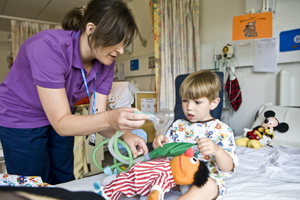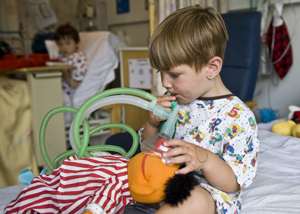Children's Centre
Having an operation
Having an operation
If you are going into hospital for an operation or procedure, you may have an anaesthetic [say: an-ass-thet-ik].
Anaesthetics are to help you feel comfortable during an operation or procedure.
There are two main kinds of anaesthethics: local and general aneasthetic.
Local anaesthethetic
A local anaesthetic will take the feeling out of the part of the body that is being worked on to make sure that you don't feel anything.

A Play Specialist shows how anaesthetic is given
General anaesthetic
A general anaesthetic will make you go to sleep for a while so that your body will keep still and you will not feel anything.Anaesthetics are given by a special doctor called an anaesthetist. This doctor will talk to you about what is going to happen and he or she will be looking after you during the operation.
The Anaethetist will ask that you don't eat or drink for several hours before your operation. This is called 'fasting'.Having food in your tummy can make you throw up during the operation and make you feel sick when you wake up again.

Young patient practices how to give anaesthetic
A lot of people will be looking after you in the operating theatre: The doctor doing the operation, the anaethetist and scrub nurses.
After your operation you will be taken to the recovery room where the anaethetist will wake you up and make sure that you do not have any pain.
You will then be taken back to your bed on the ward where you will stay until the doctor is happy for you to go home.
When you leave hospital you may be asked to come back in a few days for a check up (to see how well you have recovered) and to have your stitches taken out - if you have any.

